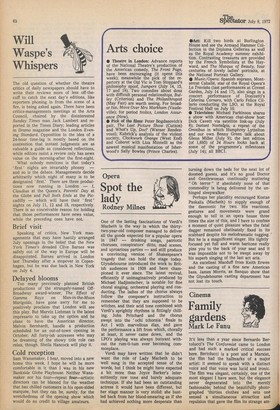Opera
Spot the lady
Rodney Milnes
One of the lasting fascinations of Verdi's Macbeth is the way in which the thirtytwo-year-old composer managed to deliver all the goods expected for a popular opera in 1847 — drinking songs, patriotic choruses, conspirators' ditto, mad scenes, and uproarious parties — and still produce a convincing version of Shakespeare's tragedy that can hold the stage today. Glyndebourne introduced the work to British audiences in 1938 and have championed it ever since. The latest revival, efficiently if unimaginatively produced by Michael Hadjimischev, is notable for fine choral singing, orchestral playing and conducting. The ladies of the chorus always follow the composer's instruction to remember that they are supposed to be witches, and their acid tone combined with Verdi's sprightly rhythms is fittingly chilling. John Pritchard and the chorus swept into the ' ochi tchornia ' finale to Act I with marvellous élan, and gave the performance a lift from which, chorally at least, it never came down, and the LPO's playing was always buoyant without the rum-ti-turn ever becoming commonplace.
Verdi may have written that he didn't want the role of Lady Macbeth to be well sung in the accepted sense of the words, but I think he might have expected a bit more than Joyce Barker's intermittently raw tone and barely adequate technique. If she had been an outstanding actress it would have been different, but her stage manner is very stolid: she bustled back from her blood-smearing as if she had achieved nothing more desperate than *Alit: Kill two birds at Burlington House and see the Armand Hammer Collection in the Diploma Galleries as well as the Royal Academy summer exhibition. Contrasting treasures are provided by the French Symbolists at the Hayward, and The Masque of Beauty, four centuries of lovely ladies' portraits, at the National Portrait Gallery.
• Music/Opera: Spanish soprano, Montserrat Caballe, star of the Royal Opera's La Traviata (last performances at Covent Garden, July 14 and 17), also sings in a concert performance of Donizetti's Caterina Cornaro, with Carlo Felice Cillario conducting the LSO, at the Royal Festival Hall on July 10.
• Television: Michael Parkinson shares a show with American chat-show host Dick Cavett via satellite link-up (July 8); Instant Nostalgia, a repeat of the Omnibus in which Humphrey Lyttelton and our own Benny Green talk about Glenn Miller (July 9); the last edition (of 1,695) of 24 Hours looks back at some of the programme's milestones (July 14); all BBC1.
turning down the beds for the next lot of doomed guests, and it's no good Doctor and Gentlewoman continually muttering "Oh terror" if absolutely none of that commodity is being delivered by the unhinged sleepwalker.
Perhaps her placidity encouraged Kostas Paskalis (Macbeth) to supply enough of the daemonic for two. His reactions, gestures and movements were grand enough to tell in an opera house three times the size of this, and I have to confess a moment of quiet pleasure when the fatal dagger remained obstinately fixed in its scabbard despite his melodramatic tugging. " But he is a magnificent singer. His tightly focused yet full and warm baritone really pins you to the back of your seat and it was impossible not to be swept away by his superb singing of the last act aria.
An excellent Macduff from Keith Erwen and the casting of a fine new American bass, James Morris, as Banquo show that the Glyndebourne casting department has not lost its touch.










































 Previous page
Previous page